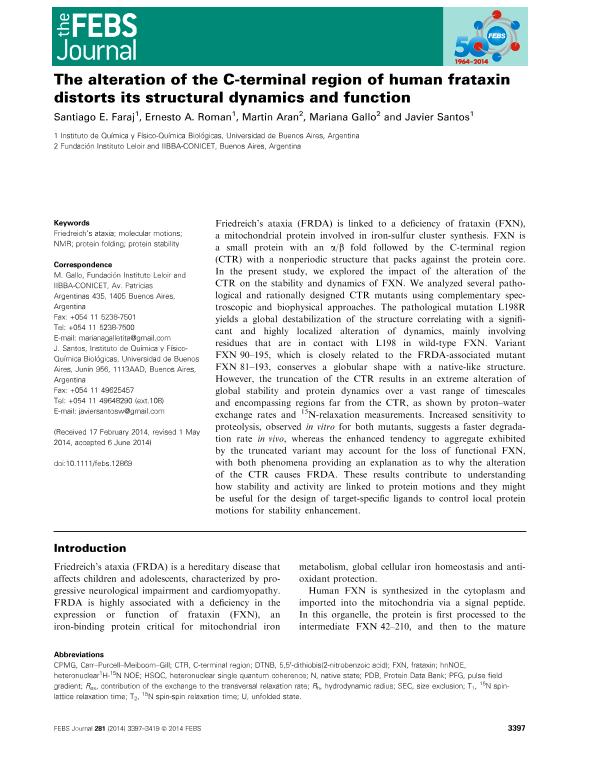Artículo
The alteration of the C-terminal region of human frataxin distorts its structural dynamics and function
Fecha de publicación:
08/2014
Editorial:
Wiley
Revista:
Febs Journal
ISSN:
1742-464X
Idioma:
Inglés
Tipo de recurso:
Artículo publicado
Clasificación temática:
Resumen
Friedreich's ataxia (FRDA) is linked to a deficiency of frataxin (FXN), a mitochondrial protein involved in iron-sulfur cluster synthesis. FXN is a small protein with an α/β fold followed by the C-terminal region (CTR) with a nonperiodic structure that packs against the protein core. In the present study, we explored the impact of the alteration of the CTR on the stability and dynamics of FXN. We analyzed several pathological and rationally designed CTR mutants using complementary spectroscopic and biophysical approaches. The pathological mutation L198R yields a global destabilization of the structure correlating with a significant and highly localized alteration of dynamics, mainly involving residues that are in contact with L198 in wild-type FXN. Variant FXN 90-195, which is closely related to the FRDA-associated mutant FXN 81-193, conserves a globular shape with a native-like structure. However, the truncation of the CTR results in an extreme alteration of global stability and protein dynamics over a vast range of timescales and encompassing regions far from the CTR, as shown by proton-water exchange rates and (15) N-relaxation measurements. Increased sensitivity to proteolysis, observed in vitro for both mutants, suggests a faster degradation rate in vivo, whereas the enhanced tendency to aggregate exhibited by the truncated variant may account for the loss of functional FXN, with both phenomena providing an explanation as to why the alteration of the CTR causes FRDA. These results contribute to understanding how stability and activity are linked to protein motions and they might be useful for the design of target-specific ligands to control local protein motions for stability enhancement.
Palabras clave:
Molecular Motions
,
Protein Stability
,
Nmr
,
Friedreichs Ataxia
,
Protein Folding
Archivos asociados
Licencia
Identificadores
Colecciones
Articulos(IIBBA)
Articulos de INST.DE INVEST.BIOQUIMICAS DE BS.AS(I)
Articulos de INST.DE INVEST.BIOQUIMICAS DE BS.AS(I)
Citación
Faraj, Santiago Enrique; Roman, Ernesto Andres; Aran, Martin; Gallo, Mariana; Santos, Javier; The alteration of the C-terminal region of human frataxin distorts its structural dynamics and function; Wiley; Febs Journal; 281; 15; 8-2014; 3397-3419
Compartir
Altmétricas




